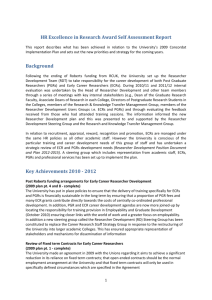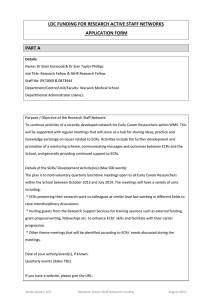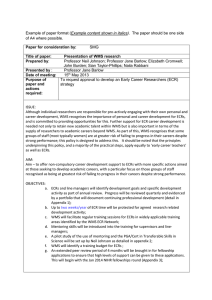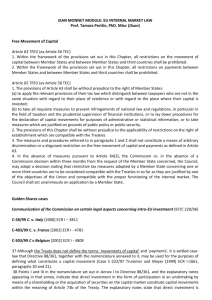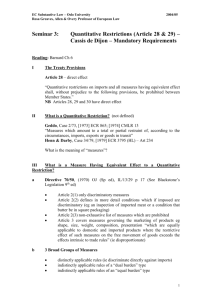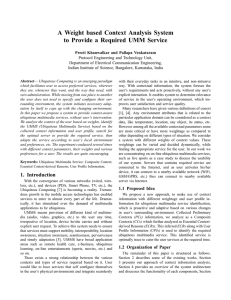de_Brantes_Board_book_Shih doc
advertisement
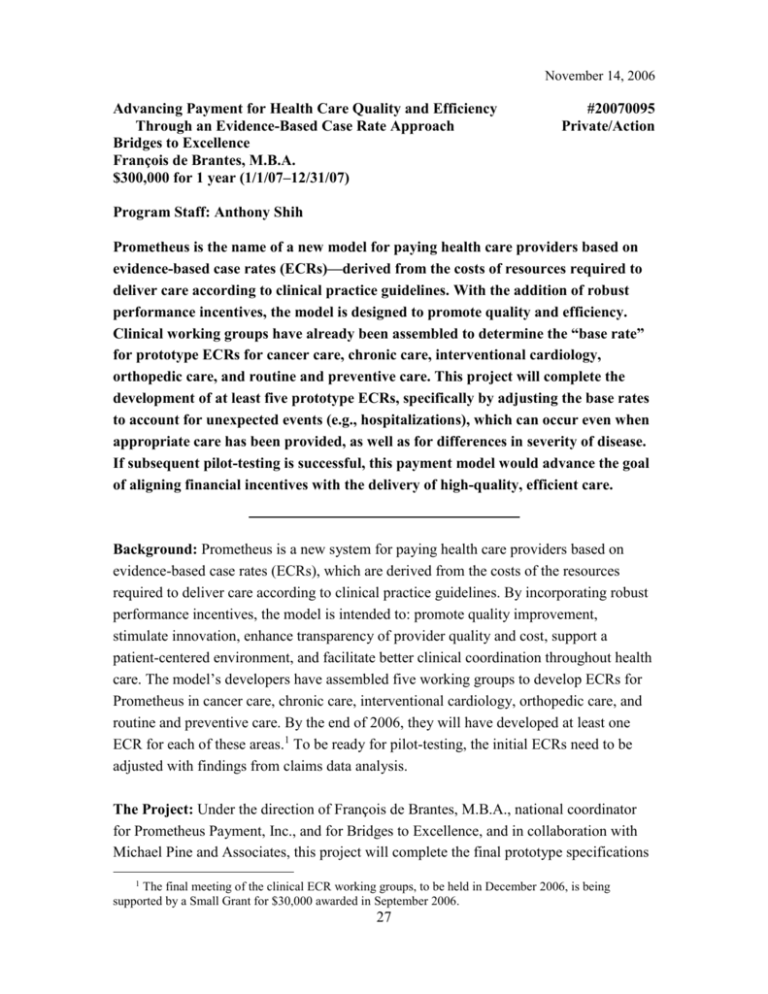
November 14, 2006 Advancing Payment for Health Care Quality and Efficiency Through an Evidence-Based Case Rate Approach Bridges to Excellence François de Brantes, M.B.A. $300,000 for 1 year (1/1/07–12/31/07) #20070095 Private/Action Program Staff: Anthony Shih Prometheus is the name of a new model for paying health care providers based on evidence-based case rates (ECRs)—derived from the costs of resources required to deliver care according to clinical practice guidelines. With the addition of robust performance incentives, the model is designed to promote quality and efficiency. Clinical working groups have already been assembled to determine the “base rate” for prototype ECRs for cancer care, chronic care, interventional cardiology, orthopedic care, and routine and preventive care. This project will complete the development of at least five prototype ECRs, specifically by adjusting the base rates to account for unexpected events (e.g., hospitalizations), which can occur even when appropriate care has been provided, as well as for differences in severity of disease. If subsequent pilot-testing is successful, this payment model would advance the goal of aligning financial incentives with the delivery of high-quality, efficient care. Background: Prometheus is a new system for paying health care providers based on evidence-based case rates (ECRs), which are derived from the costs of the resources required to deliver care according to clinical practice guidelines. By incorporating robust performance incentives, the model is intended to: promote quality improvement, stimulate innovation, enhance transparency of provider quality and cost, support a patient-centered environment, and facilitate better clinical coordination throughout health care. The model’s developers have assembled five working groups to develop ECRs for Prometheus in cancer care, chronic care, interventional cardiology, orthopedic care, and routine and preventive care. By the end of 2006, they will have developed at least one ECR for each of these areas.1 To be ready for pilot-testing, the initial ECRs need to be adjusted with findings from claims data analysis. The Project: Under the direction of François de Brantes, M.B.A., national coordinator for Prometheus Payment, Inc., and for Bridges to Excellence, and in collaboration with Michael Pine and Associates, this project will complete the final prototype specifications 1 The final meeting of the clinical ECR working groups, to be held in December 2006, is being supported by a Small Grant for $30,000 awarded in September 2006. 27 November 14, 2006 for ECRs in the initial five clinical areas noted above.2 The clinical ECR working groups will determine “base rates” for each ECR—the estimated total costs of services, such as physician visits and laboratory tests, recommended by evidence-based guidelines. Using data from a large employer representing more than 8 million patients, as well as data obtained from Medicare claims and from the American Medical Group Association, the project team will adjust each base rate to account for unexpected events (e.g., hospitalizations) that can occur even when appropriate care has been provided, as well as for differences in severity of disease. Once the rates are determined, the team will conduct additional analysis using the same data sources to determine the appropriate ECR payment allocation among the different types of providers seen by a given patient. Project staff will prepare at least two manuscripts relating to the ECR development process for journal submission. In addition, a report prepared for the Fund will outline the policy implications of this work. 2 Bridges to Excellence is one of the largest employer coalitions in the U.S. involved in pay-forperformance. Michael Pine and Associates is an analytic consulting firm specializing in monitoring and improving clinical quality and the cost-effectiveness of health care. Prometheus Payment, Inc., was established to develop and promote the Prometheus payment model. Funds are being awarded through Bridges to Excellence because Prometheus Payment has not yet received 501(c)(3) tax-exempt status. 28



